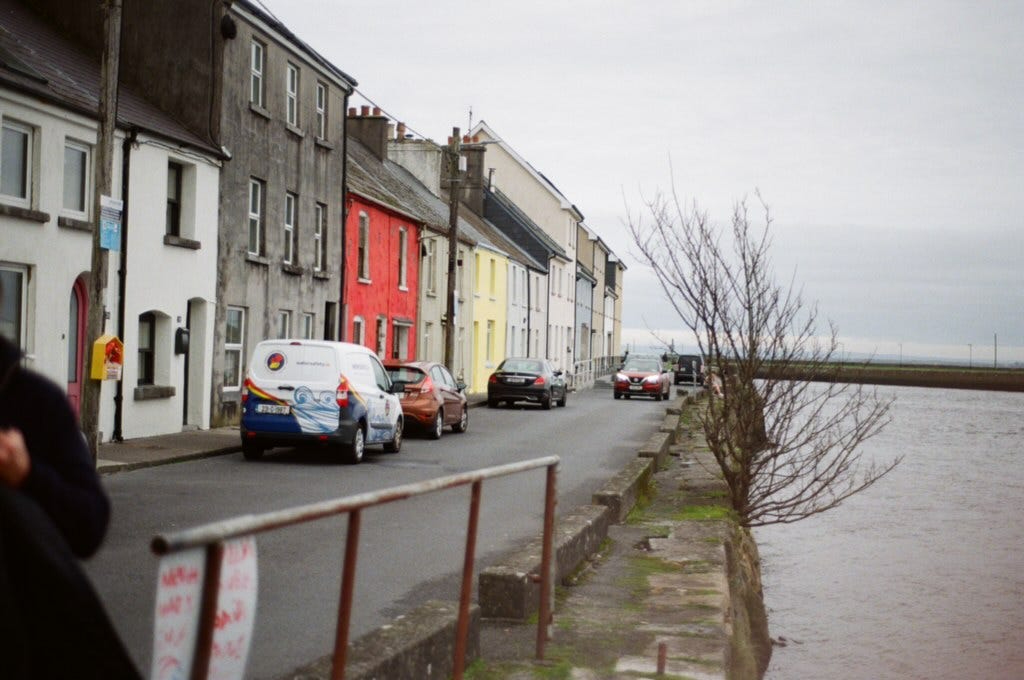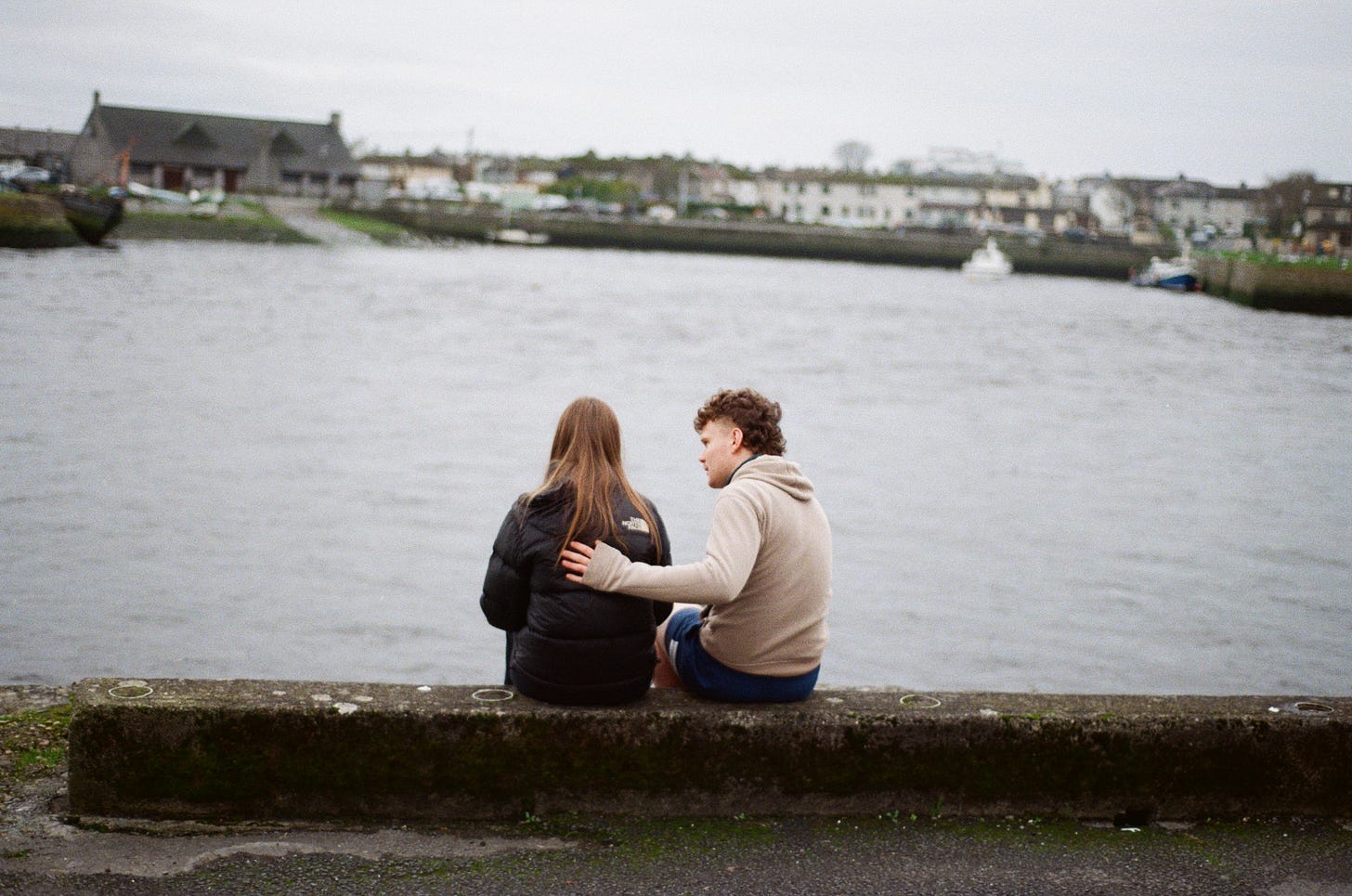Hungover in Ireland
America everywhere, worldwide hipsterdom, and chaos in Dublin
In Ireland bathrooms are hidden behind a maze of doors and small rooms.
There is a door marked bathroom, which leads to a smaller sort of foyer, an impossibly cramped room with no discernible purpose other than to create a psychic, and physical, buffer against the outside world. As best I can tell it’s a manifestation of guilt in a deeply Catholic nation, the foyer as a space of penance we owe God for being the sorts of vile creatures destined to piss and shit so long as we draw breath. But then the bathrooms are called “toilets” in Ireland, there’s no euphemistic “restroom” or “WC” or even “bathroom.” There is shame, certainly, but at least the Irish people can be direct about it.
For Thanksgiving, I visited my youngest brother in Galway, Ireland, where he is in school. We went to the sort of places one would expect a young American student to frequent in a foreign city: corner stores serving counterintuitively delicious gruel, pubs with Sky Sports subscriptions, where live musicians lean into a sort of Guinness-and-Jameson-ville affect, belting their hearts out to bottom-of-the-barrel U.S. hits and britpop, a feverish series of cover-band mashups, a minute or chorus at a time, exposing the complete flatness and homogeneity of our popular culture by demonstrating how easily one object blends into another, but with great, almost heartbreaking, sincerity. It’s an experience I have almost every time I leave the country: you go to briefly escape America, then you laugh at manifestations of American culture abroad, then you realize with grim finality that America is inescapable. On Thanksgiving we watch NFL football on Sky Sports, and the spectacle of a table of British men discussing the Dallas Cowboys is nearly too much to bear. European NFL fans send tweets into Sky of their gameday setups, soyfacing in bearded groups or alone with their sleeping, NFL-jersey-wearing dog. There are people here who will stay up until 4am to watch the San Francisco 49ers blow out the Seattle Seahawks, who will unknowingly celebrate a holiday that most Americans view as something between an obligation and a punishment.
We drink a lot of Guinness, which I’m mindful of. I live in New Orleans, a place as caricatured in the public imagination as Ireland, and so it’s impossible for me to separate in my mind the act of drinking Guinness from, say, the slobs grinning down Bourbon Street, adorned in beads despite the season, shoveling Hurricanes and Cafe Du Monde beignets down their throats. Still, I enjoy them: Guinness fortifies you against the brittle rain, warms your bones, possesses almost medicinal properties. We order rounds of pints and attempt to calibrate our first sips so that they leave the head of the beer aligned perfectly with the midline of the glass’s “G.” It makes me feel like a child, playing a silly game with my brothers, and in the mornings my mouth is impossibly sour.
My brother lives in student housing, white high-rise dormitories just across from a Tesco and a Subway. The lights in his bathroom have been out for the last five weeks. His building is populated half by students, half by Ukrainian refugees. We sit across a group of five Ukrainian women at a pub one night — they sit severely at their table until leaving for a cigarette break; when they return, they gossip almost cheerily.
One day, my brother shows us his walk from his dorm to the city. You cross mall parking lots, a four-lane highway, demonstrators waving Palestinian flags. He shows me his favorite storefront, a small business humbly called “Brazil,” which is nominally a restaurant but in which’s window one can reliably find a man getting a haircut. Later, at a bookstore, I see a book from a writer who has kindly “recommended my blog” on their own (yes, I see when people do these things; yes, I appreciate it tremendously) and smile with vague parasocial pride. I mention the internet connection to my mother, and she buys a copy of the novel as immediately as she would support a childhood friend of mine. It’s funny to imagine explaining the concept of a parasocial—or even just a mutual internet—friendship to your parents; the opportunity presents itself to me during a conversation about Taylor Swift and Travis Kelce, but I think better of it.
On my 28th birthday, I take the train across Ireland into Dublin. I’m sleep-deprived, hungover, hardly able to stomach a day pacing around the city that I’d once thought would be a nice gift to myself. I out myself as an American with my sleepless eyes and my copy of American Tabloid (my birthday is the anniversary of JFK’s assassination, and so I have a cosmic tie to its histories, I’m allowed to care and speculate without being written off as a “podcast bro” or “conspiracy bf,” it’s a fig leaf from an often cruel universe).
I can’t bear to listen to music on the train—romanticizing your life doesn’t work when you’re this tired, movie characters sleep even if you don’t see them do it—but once in Dublin I pace around the city like Leopold Bloom with a passing awareness of the TimeOut 40 coolest neighborhoods in the world list and a Blackbird Spyplane subscription. It’s a dreary day, and I’m reminded why I love Dublin. Both the city’s beauty and its grime are magnified by the permanent drizzle pattering down. I go into hip restaurants and musty pubs, glimmeringly unfriendly coffee shops and well-curated, expensive clothing stores. In the towering shadow of a brand-new skyscraper, I buy a flat white and a danish from a store that does not allow its customers to stand inside it. Later, I sip orange wine and pick at haddock-and-chips as MF DOOM plays over the speakers; I am in Dublin, surely, but really I could be everywhere. Intentionally or not, I am a storm trooper for what Kyle Chakya calls AirSpace, the airbnbification of the world around us, yuppie globalization, the process by which everything, even Brooklyn, quickly becomes an Epcot version of Williamsburg. I realize that aside from the McDonalds, the Dominos, the superheroes, the real slop, the real globalized monoculture is a sort of gentle, urban bourgeois hipsterdom. I’m dizzied by a bit too much of introspection, on my birthday no less, and take a break in the park, watching swans bob lazily across the water.
After seeing enough advertisements for it across town, I decide to check out the Andy Warhol exhibit at a city gallery. I’m not particularly fond of Warhol, the whole proto-Dimes Square thing, others have written about it, I’m not going to waste anybody’s time or my proverbial breath, but I want something to look at and figured it was worth an hour of my time. Before entering, I linger in Parnell Square East, watching a man take a self-timed, full-body selfie in the Garden of Remembrance. I’m struck by the statue at the head of a cross-shaped pool, a series of swans appearing to propel themselves off the backs of slouching humans. I try to take a picture but fail to capture what about it moves me, then begin to feel a bit perverted about the whole thing.
The first thing I see at the Warhol gallery is a horde of young tourists jostling one another to pose in front of a series of Marilyn Monroes for photographs. Once again I’m beset by a feeling of grotesquerie, feeling resentful of the new instinct to document everything, to turn the world around us into a shitty picture on our phone, presumably to be shared, to turn our actual lives into fodder for the life that actually matters, the internet. After enough time with Warhol, though, with the soup cans and the Maos and the JFKs (I experienced as many JFK-related ‘coincidences’ on November 22, 2023 as the Secret Service and Dallas Police Department did in November 22, 1963), I start to feel more ambivalent about the matter. Posing in front of the art may be tasteless, yes, but Warhol’s work does not merit reverence. It’s vapid, commerce-as-commerce that hardly even bothers to pretend otherwise, far less predictive of our modern cultural morass than it is responsible for it. By the end, I want to pose in front of Marilyn too; enough time with this cynical art makes you feel entitled to your fifteen minutes.
A number of schoolchildren enter the gallery as I leave. Outside, on Parnell Square East, there are more of them, schoolchildren everywhere. Further down the road, a group of them asks every passing bus to honk; each obliging beep is met with a roar of cheers.
24 hours later, almost exactly where I am standing, three schoolchildren and a teacher are tragically stabbed. The news horrifies; simultaneous to that horror, it dawns on me what it must be like to live in a place without guns. That night, the once-honking buses are on fire, set ablaze by rioting anti-immigrant hooligans in purported response to the stabbing, the type of riot that doesn’t appear to happen in Dublin, at least not until now. I’m gone by then, having missed chaos by a day, and so I scroll Twitter, watching cars burn and people smugly disagree with one another.







Was the coffee shop Proper Order?